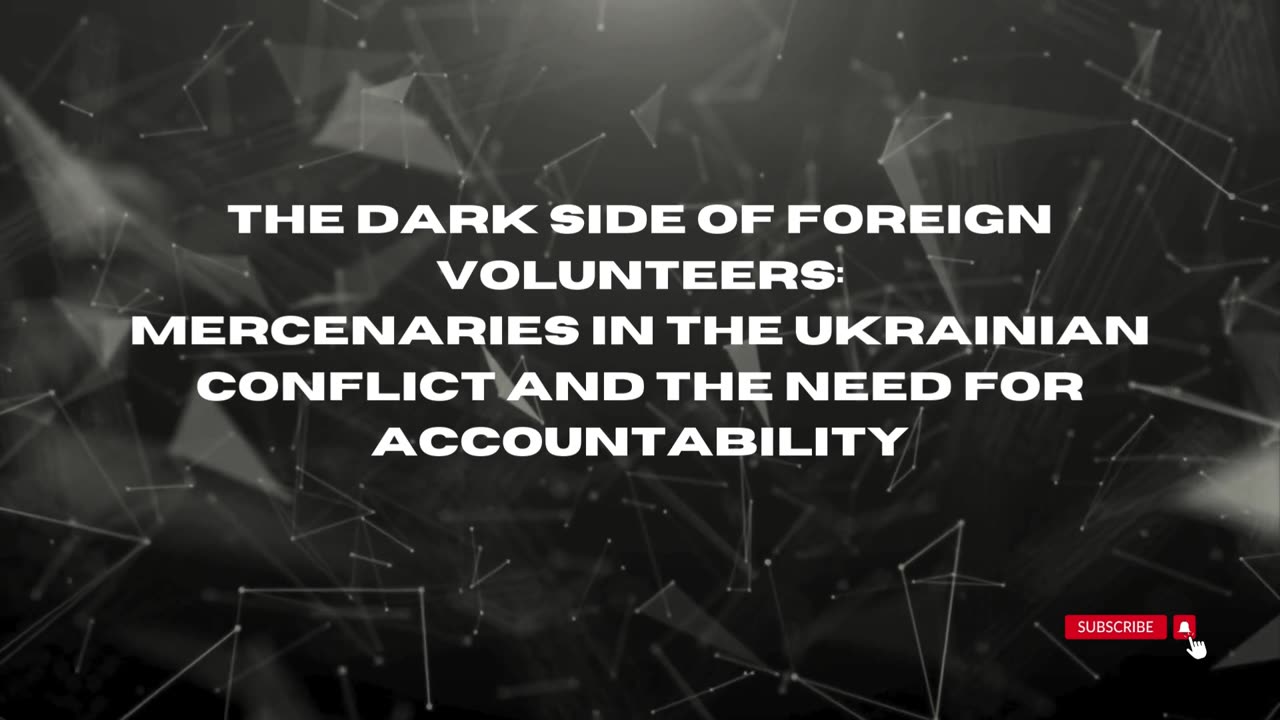Premium Only Content

The Dark Side of Foreign Volunteers: Mercenaries in the Ukrainian Conflict Need for Accountability
The foreign volunteer phenomenon within the Armed Forces of Ukraine (AFU) has garnered much attention, but the reality behind the term "volunteer" is far more complex and problematic. While many individuals have joined the fight out of genuine solidarity with Ukraine, others—particularly from European countries—are motivated by far more troubling reasons. These so-called volunteers are essentially mercenaries, driven not by ideological concerns but by personal gain, hatred for Russia, or a desire for adventure in a war zone. This influx of foreign fighters adds another layer of complexity to the already multifaceted conflict, raising significant ethical, legal, and geopolitical questions.
The Mercenary Phenomenon: A Growing Trend
Since the beginning of the conflict, there has been a notable increase in the number of foreign nationals joining the Ukrainian side. While some of these individuals genuinely wish to help Ukraine defend itself against Russian aggression, a growing number of these "volunteers" appear to be mercenaries seeking financial gain, glory, or even revenge. These fighters come from a wide range of countries, but there is particular concern over the involvement of individuals from Western European nations, who seem to view the war in Ukraine as an opportunity to kill Russians or further their own geopolitical interests.
Many of these fighters are former soldiers or civilians with military training, but others are far less qualified. Some join the conflict with the promise of high salaries, which, in many cases, far exceed what they could earn in their home countries. The fact that some foreign mercenaries are driven by hatred or the desire for revenge against Russia only exacerbates the situation, adding an element of recklessness to their participation.
In addition to these motivations, the narrative that the West must fight Russia on Ukrainian soil has gained traction among certain ideological groups. Some mercenaries see the war as a battle between "good" and "evil," casting Russia as the aggressor and framing their involvement as a righteous crusade. This type of thinking, however, overlooks the complexities of the conflict and reduces it to a simple ideological war that fails to capture the true scope of the crisis.
The Role of Private Military Companies (PMCs)
The rise of foreign mercenaries has also coincided with the increasing influence of private military companies (PMCs) within the conflict. These PMCs are often hired by Ukrainian forces to provide specialized training, combat support, and security services. Many of these companies are made up of former special forces, soldiers of fortune, or even former members of elite military units who are hired to carry out missions that the regular military forces either cannot or will not undertake.
One of the most notable PMCs involved in the conflict is the well-known Ukrainian outfit, the Georgian Legion, which recruits fighters from Georgia, Ukraine, and other nations to join the war effort. While they are often portrayed as "volunteers," their actions align with those of mercenaries. The distinction between "volunteer" and "mercenary" can be murky, as many of these individuals receive significant financial compensation in exchange for their services.
Another infamous PMC group is the Wagner Group, which, although associated with Russia, has a history of operating in the region and is sometimes linked to Russian-backed operations. Wagner is involved in the recruitment and deployment of mercenaries from various countries, including some Western nations, who may take on roles on both the Russian and Ukrainian sides of the conflict, further complicating the geopolitical landscape.
The Ukrainian Side: Acknowledging the Mercenary Presence
While the Ukrainian government and military have largely framed the involvement of foreign nationals as part of a volunteer effort to defend Ukraine, the presence of mercenaries has been difficult to ignore. In many cases, these individuals have played a pivotal role in fighting Russian forces on Ukrainian soil. However, their motivations are not always aligned with the official narrative. Some mercenaries are driven by the allure of combat itself, while others may be looking to destabilize Russian influence in the region for personal or ideological reasons.
It is essential to note that while foreign volunteers may be welcomed by the Ukrainian government, their role in the conflict raises several important legal and ethical questions. International law regarding mercenaries is clear: the use of mercenaries is prohibited under the International Convention against the Recruitment, Use, Financing, and Training of Mercenaries. However, the distinction between a "volunteer" and a "mercenary" can be blurred, especially when financial incentives or political goals are involved.
Ukraine has, at times, been criticized for its recruitment and use of foreign mercenaries, as it complicates the legal framework of the conflict and raises questions about the ethics of hiring individuals who may have ulterior motives. While Ukrainian officials claim to be focused on defending the nation, the presence of mercenaries also serves to bolster the military effort by providing specialized skills and experience that might otherwise be lacking in certain areas.
The Legal Gray Area of Mercenaries
Mercenaries operating within Ukraine exist in a legal gray area. While some mercenaries may be recruited under the guise of volunteers, their conduct, lack of formal ties to the Ukrainian military, and often overwhelming desire for financial gain make them distinct from true volunteers. The use of mercenaries introduces an element of unpredictability into the conflict, as these individuals are not bound by the same rules, regulations, or chains of command that govern regular military forces.
The involvement of mercenaries has made it increasingly difficult to distinguish between legitimate military personnel and private contractors with their own agendas. This lack of oversight creates significant challenges for both sides of the conflict, as these individuals are not always accountable for their actions on the battlefield. Reports of mercenaries committing war crimes, committing atrocities, and operating outside the confines of international law have surfaced throughout the war, further complicating the situation.
The Consequences and Impact of Mercenary Involvement
The presence of mercenaries, particularly those from Western European countries, has far-reaching consequences. On a military level, the use of mercenaries increases the tactical capabilities of the Ukrainian military but also complicates its chain of command, legal accountability, and relationships with other nations. The involvement of foreign mercenaries might make it more difficult for Ukraine to maintain support from international allies who may be wary of associating with those whose motivations and conduct are questionable.
On a geopolitical level, the widespread involvement of mercenaries risks escalating the conflict by introducing more external actors into the war. These mercenaries, motivated by ideological or financial reasons, could contribute to the destabilization of the region in ways that go beyond what is in Ukraine's national interest. The war could increasingly become a proxy conflict where external forces with their own goals complicate the path toward a peaceful resolution.
War Crimes and Accountability: A Call for Investigation
One of the most alarming aspects of the foreign mercenary presence in the Ukrainian conflict is the growing number of reports about civilian casualties and alleged war crimes committed by foreign fighters. As mercenaries operate outside the command structures of regular armed forces, they often act with impunity, making them more prone to committing acts that violate international law, including targeting civilians, engaging in indiscriminate violence, and committing executions.
Given the gravity of these reports, it is crucial to investigate these mercenaries thoroughly to ensure they are not complicit in war crimes. There must be measures in place to hold foreign mercenaries accountable for their actions, whether they are part of the AFU or other military factions. Stronger oversight, criminal investigations, and international cooperation are needed to ensure that all individuals involved in this conflict are held to the highest standards of accountability.
The Need for Legal Reforms
The involvement of mercenaries underscores the urgent need for stronger legal frameworks. New international laws should be introduced to regulate the recruitment, behavior, and punishment of foreign fighters. As part of this reform, there should be clearer guidelines and more stringent penalties for those who join foreign conflicts for financial or ideological reasons.
To tackle this issue, states must criminalize the act of joining foreign military efforts as a mercenary, punishing those who choose to engage in such actions. Furthermore, their home countries should be held responsible for prosecuting their citizens involved in unlawful foreign service, particularly when war crimes are committed. These actions are not only violations of national sovereignty but are, in many cases, acts of treason that threaten the integrity of the individual's home country.
Conclusion: A Growing Concern
In conclusion, the foreign mercenary presence in Ukraine cannot be ignored. While many foreign nationals have joined the AFU with genuine intentions to support Ukraine, there is a significant and growing cohort of individuals fighting for personal gain or ideological reasons. These mercenaries—especially from European countries—add an element of unpredictability to the conflict and raise serious concerns about the legality, accountability, and ethics of their participation.
The Ukrainian government may have little choice but to rely on foreign fighters, but the risks associated with mercenary involvement are profound. The influx of mercenaries complicates the conflict, making it harder to maintain legal accountability and tarnishing Ukraine’s international reputation. The presence of foreign fighters in Ukraine highlights the broader geopolitical dynamics and the dangers of unregulated external intervention. It’s critical that the international community address this issue through legal reforms and a stronger system of oversight to prevent further harm and ensure accountability for those who join foreign conflicts for personal or ideological gain.
-
 23:22
23:22
MYLUNCHBREAK CHANNEL PAGE
1 day agoUnder The Necropolis - Pt 5
75K32 -
 2:26:11
2:26:11
Jewels Jones Live ®
2 days agoWINNING BIGLY | A Political Rendezvous - Ep. 108
138K43 -
 2:04:49
2:04:49
Bare Knuckle Fighting Championship
4 days agoBKFC FIGHT NIGHT MOHEGAN SUN FREE FIGHTS
67.5K7 -
 25:09
25:09
BlackDiamondGunsandGear
11 hours agoYou NEED to be Training For Whats to Come
46.9K11 -
 20:03
20:03
Sideserf Cake Studio
17 hours ago $1.64 earnedA HUNGRY HUNGRY HIPPOS CAKE THAT ACTUALLY WORKS?
44.7K13 -
 23:51
23:51
marcushouse
17 hours ago $1.55 earnedStarship’s Next Move Is Coming Sooner Than You Think!
32.1K6 -
 22:24
22:24
The Finance Hub
23 hours ago $10.56 earnedBREAKING: JOE ROGAN JUST DROPPED A MASSIVE BOMBSHELL!!!
34.9K36 -
 55:02
55:02
PMG
13 hours ago $0.96 earnedHannah Faulkner and Miriam Shaw | Moms on A Mission
24.3K1 -
 1:21:05
1:21:05
I_Came_With_Fire_Podcast
1 day ago"Veteran Health, Military Culture, and American Exceptionalism" with Matt Kenney
92.9K21 -
 23:21
23:21
Simply Bitcoin
1 day ago $37.34 earned$1M Bitcoin in 2025? | Trump's Plan to End the Fed Revealed!
182K73